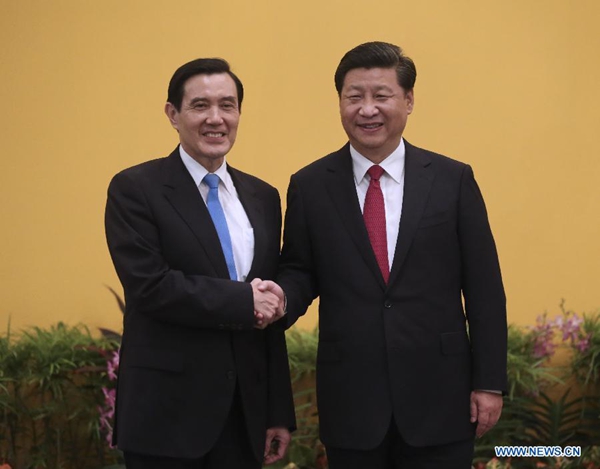Xi and Ma's handshake makes history
- By Luo Huaiyu
 0 Comment(s)
0 Comment(s) Print
Print E-mail China.org.cn, November 9, 2015
E-mail China.org.cn, November 9, 2015
|
|
|
Xi Jinping (R) shakes hands with Ma Ying-jeou during their meeting at the Shangri-La Hotel in Singapore, Nov. 7, 2015. (Xinhua/Lan Hongguang) |
Xi Jinping and Ma Ying-jeou's historic handshake and meeting in Singapore marks the first face-to-face engagement between leaders of the two sides of the Taiwan Strait in nearly seven decades. Peace-loving Chinese across the Strait most likely will see this as an encouragement for the future of cross-strait relations; however, for people mired in the independence paradox, it might mean redoubled anxiety.
World media are generally positive, as evidenced by the almost unanimous use of the word "historic" in the headlines. From a geopolitical point of view, there is good reason to celebrate, because the meeting contributes to a more effective management of regional security risks and uncertainties, and thus will serve the interests of all the stakeholders of this region.
This is the most significant top-level interaction and the most precious display of brotherhood so far between the Mainland and Taiwan.
However, not everyone is happy, and for varying reasons, they are either downplaying the importance or even criticizing the meeting. Firstly, those who have taken advantage of Taiwan as a type of strategic outpost or a means of leverage may feel disappointed. In their view, the meeting can give an unwanted boost to the "one China consensus" across the Strait and consequently weaken the role they have assigned Taiwan to help contain China or tamper with its peaceful development.
People of such mindset should remember the late Lee Kuan Yew's insight in One Man's View of the World, or simply think about this question: if Taiwan has been unable to secede from China for the past 70 years, how can it ever do so in the future, given the growing economic interdependence and mutual understanding across the Strait?
Secondly, there are also people who think the Xi-Ma handshake is no more than a symbolic gesture that will produce nothing concrete, referring to the fact that no formal agreement or deal was signed. People with such an understanding have yet to learn more about the Chinese way of doing things and view the state of affairs across the Strait from a perspective of change.
The Singapore meeting sends a political signal more unequivocal than ever that the Mainland and Taiwan belong to one China both in theory and in practice, and that the two sides can work creatively together to resolve any real or potential problem between them.
Such a political signal in itself is more important than any concrete deal at this stage. It may serve as an exemplar for political forces in Taiwan wanting to subscribe to the peaceful development of cross-strait relations, but a straitjacket for those of ambivalent or paradoxical political persuasions.






